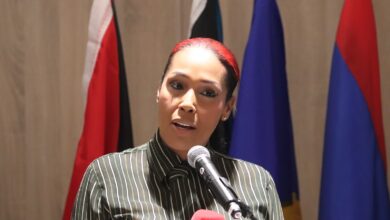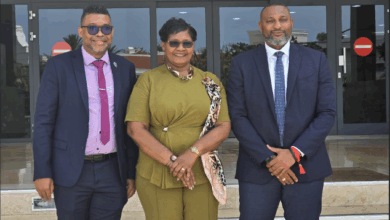(CARICOM Secretariat, Turkeyen, Greater Georgetown, Guyana)
Opening Statement by the Hon. Dean Oliver Barrow,
Prime Minister of Belize
At the Opening Ceremony
For the Twenty-Seventh Inter-Sessional Meeting
of the Conference of Heads of Government
of the Caribbean Community (CARICOM)
February 15-17, 2016
Placencia Hotel, Belize
![]()
It is my privilege and pleasure to welcome you to our country and to the Placencia peninsula.
We think this an idyllic spot. The Maya mountains, part of their world-famous eponymous Biosphere, are in back of us; and to the front is our Caribbean Sea, shared patrimony of CARICOM and SICA and emblematic of the proud duality that Belize is heir to.
I hope that the legacy features of these surroundings will act as aid and inspiration to our deliberations.
And very important deliberations they are.
For while that is always the case whenever we meet, I may be forgiven for thinking, and hope to make clear, that our issues and challenges are particularly pronounced at this time.
Let me therefore begin by considering the general economic climate in which we currently find ourselves.
There has been a failure of the world economy to recover properly from the shock of the financial crisis that began in the last part of the first decade of this new century. That failure, for the majority of us in CARICOM, has meant slow growth, increasing difficulties with our public finances, and tremendous strains on our capacity to satisfy the life-improvement aspirations of our people. And it is worth noting that even in the few countries that have shown substantial enough expansion, much of the net effect has been depreciated by population increases. On the bright side, though, there appears to be what we hope will be a sustained resurgence in our region's all-important tourism industry. This would be a welcome offset to the continued volatility in our commodities sector.
The global oil price rout has, in particular, been a double-edged sword for a couple of us. So we salute the recent petroleum discoveries in Guyana and look forward to that country being able to exploit those resources on its own terms; and we welcome the benefit to consumers that cheaper fuel has meant. But at the same time we regret the effect that both the contraction of production and the precipitate price drop have had here in Belize. And we note the even stronger detriment of the latter on public sector revenues in Trinidad and Tobago.
As well, the oil conundrum has severely constrained the flow of resources to those of us that participate in the PetroCaribe arrangements. This is, of course, in consequence of the havoc done to Venezuela, the source of our erstwhile bounty.
To compound matters, it is clear that the oil price phenomenon is symptomatic of the more generalized weakening, to which I earlier alluded, in commodities markets. This worsens the crisis situation in public finances in certain parts of the Eurozone, so that altogether there appears to be a distinct possibility of the world economy sliding back into recession. The consequences that would entail for our region are both obvious and frightening.
And when we move from the general to the particular regarding global economic and financial currents, there is one already extant development with absolutely cataclysmic ramifications for us. I am talking, of course, about the phenomenon of so-called de-risking.
Under pressure from their regulatory authorities in Europe and especially the US, banks in those jurisdictions have been closing their correspondent relationships with our indigenous financial institutions. This deprives our banks of the ability to keep US deposits, do wire transfers, facilitate credit card settlements for their local clients and our economy. The implications of this for our international trade, for our remittances, for our structures of
production, consumption and investment, are so obvious as to require little further elaboration. It is therefore no hyperbole to say that, especially in an environment where the value of our imports and exports taken together equals or exceeds our GDP, any attenuation, not to say complete cutoff, respecting our trade and remittance flows, constitutes a clear, present and compendious danger.
It is in this context of Belize, like so many others of us, being so fundamentally threatened, that I went to Washington two weeks ago for the express purpose of taking up this matter directly with the US Regulators.
And, truth to tell, I received much tea and sympathy. The former, in the aftermath of the historic blizzard Washington had just experienced, was welcome. But it was not immediately clear that the latter, politesse apart, sufficiently advanced matters.
The Regulators all agreed that, absent a solution, our economies, our societies would go belly up; and conceded that could be in no one's interest, including theirs. The sticking point, though, was their proclaimed inability to oblige their private sector banks to engage or
re-engage with ours. So the highest expression of that sympathy unguent I earlier mentioned, was no more than an undertaking by the US Regulators to say to their banks that our jurisdictions have done and are doing everything we can to be fully AML/CFT
compliant; and that there was therefore no in principle objection to those banks doing business with us. But ultimately, the Regulators insisted, it was strictly a decision for those sovereign US banks to make. They would have to decide whether it was in their financial
interest to deal with us, assume the full transactional weight of the resulting monitoring and reporting requirements, and run the risk of nevertheless paying huge fines if anything went wrong. Or, the US banks could simply continue to take the path of least resistance on the basis that our minuscule margins were not worth the trouble. It could not be supposed, of course, that any thought as to the catastrophe waiting to overtake our countries would enter into those banks' straightforward risk/reward calculus.
Despite, then, verbal emollients and undoubtedly sincere protestations of concern, the limitations on action stated by the Regulators seemed, in our circumstances, to pose an uncuttable Gordian knot. Then, as though to assist my digestion of realpolitik 101, a certain article appeared in the Financial Times just after my Washington meetings. It was a report on how developed country banking regulators were actively assisting Iranian banks to re-enter
the global financial system following the lifting of economic sanctions. So the barriers on regulatory intervention are apparently far less constraining for a big country than for a small one, even when that big country has been dubbed a pariah and demonized these last few years.
To be fair, the U.S.Authorities have been as good as their word and have now spoken to at least one potential correspondent bank that Belize has approached. The outcome of that is still pending.
Meantime our campaign, and I speak now of CARICOM, continues. And it cannot be other than relentless in the face of the possible correspondent banking Armageddon that we face. It is therefore a matter that looms extremely large on our Agenda over the next two days, and has already been the subject of a dedicated Finance Ministers meeting this morning. Without prejudice to any other recommendations that will come to us from that meeting, I signal now that Belize will offer the following for consideration. Surely our respective country banks can get together across jurisdictions and as a bloc approach target banks in the U.S. for pooled correspondent services. That way we should be able to leverage the critical mass needed to make our business volume worthwhile in terms of the risk/reward equation. The modalities and logistics will take some working out but clearly are not beyond our skills.
Colleague Heads, Ladies and Gentlemen:
I am trying to reiterate what we know only too well. The reality that forces us to acknowledge the limitations of individual smallness, is the same reality that obliges us to size-up both in terms of collective thinking and collective action. A precondition to this, though, is that we talk less and do more. If there is a perceived mismatch between CARICOM rhetoric and CARICOM achievement, we need to tone down the rhetoric and step up the achievement. It may mean a lessening of grandiose goals. It may mean long-haul, quotidian
grind to achieve incremental accomplishments. Drudgery in the garret rather than flash-in-the-pan brilliance. But the times do seem to require this sort of workmanlike focus to wring from difficult circumstances the kinds of realizable, measurable objectives our people deserve. And on the back of sustained slogging there is quite a bit we can do for ourselves even with respect to those generally recessionary global economic conditions about which I
spoke earlier.
But I repeat: stock taking now for purposes of a reset requires a hard-headed assessment of where we are, where we need to go and how we get there. We need to settle on achievable goals for the immediate and medium term, and specify and take the necessary steps for realization on a time- and-action basis. In the process we may recognize, for example, that there is need for a workaround of the unbridgeable gap between our aspirations for a perfect single market and economy, and individual circumstance and sovereignty constraints. The nimbleness and flexibility that must be deployed to adjust to the changing world circumstances, may themselves militate against the centralized management mechanism that a full CARICOM single economy posits. So that to be driven back to a reliance on the less lofty but more practical virtues of functional cooperation, may be no bad thing.
In saying this, I am perhaps merely repeating what was stated some time ago by a past CARICOM Prime Minister: that our common cause effort simply cannot all at once incorporate the multiplicity of our individual drivers; that concentrating on the less poetic but more workable dimensions of our integration movement is both sensible and unavoidable; that to admit this is not to admit failure since prioritizing the more readily successful cooperative ventures does ultimately lead to the optimum future deepening that
we both desire and deserve.
I realize that in suggesting what may appear to be a utilitarian, journeyman course of action, I am being counterintuitive; that it is at odds with our Caribbean penchant for heady visions and soaring oratory. And I certainly do not seek in any way to diminish the inspired legacy of our Community's founders. But the course of integration, as the threatened unraveling now of the European experiment makes clear, never did run smooth. And I certainly want to avoid, in simple hackneyed terms, missing the forest for the trees. Or proceeding only by way of what Eisenhower called 'spasmodic reaction to the stimulus of emergencies'.
Given all this, then, I believe that our efforts must focus on retaining and improving all that has worked. We therefore ought not to go pell-mell with what has been described as the built-in CARICOM integration agenda. On the other hand we must at once intensify those aspects of the CSME on which we are all fully agreed, and which we are all prepared fully to implement.
A more compressed canvas will surely sustain a more concentrated commitment. And that latter is what we as leaders owe to our people and to ourselves.
I thank you.





